By providing an email address. I agree to the Terms of Use and acknowledge that I have read the Privacy Policy .

Going abroad? More documents needed, stricter rules to follow starting Sept. 3
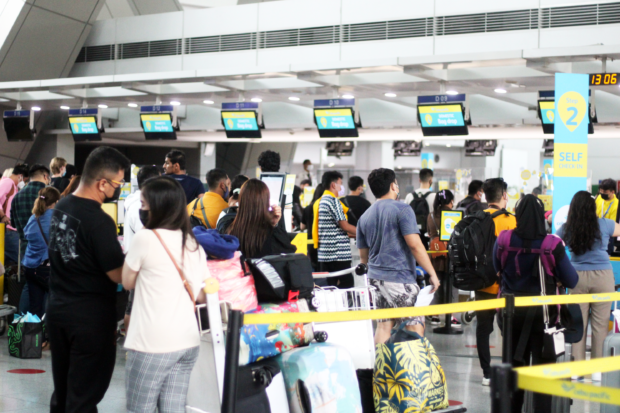
Travelers arrive at the Ninoy Aquino International Airport (NAIA) Terminal 3 in this file photo taken in November 2022. INQUIRER file photo / SAMUEL YAP
MANILA, Philippines —Filipinos traveling overseas will soon be asked to present more documentary requirements and comply with new stricter travel regulations.
The Inter-Agency Council Against Trafficking (IACAT) is set to implement its revised guidelines for the departure of Filipinos traveling abroad starting September 3.
In a recent statement, the IACAT explained that it has revised the departure protocols during the 58th Regular Council Meeting to “combat the grave menace of human trafficking.”
“It is of paramount importance to emphasize that the Revised Guidelines have been formulated not to encroach upon the fundamental right to travel, but to serve as a protective bulwark shielding our fellow citizens from the dire perils of human trafficking,” said IACAT.
“IACAT ardently anticipates that the enforcement of these meticulously refined Guidelines, complemented by an enhanced regime of information dissemination, will effectuate a palpable reduction, if not outright elimination, of human trafficking incidents,” it added.
Based on the revised guidelines, basic travel documents now consist of the following:
- Passport, valid at least six months from the date of departure;
- Appropriate valid visa, whenever required;
- Boarding pass;
- Confirmed return or roundtrip ticket, when necessary
In addition to the inspection of basic travel documents, the immigration office (IO) may then require the traveler to answer clarificatory questions as well as ask passengers for the following supporting documents:
For Tourists:
1. Self-funded Travels
- Confirmed return or roundtrip ticket;
- Proof of hotel booking/accommodation;
- Financial capacity or source of income consistent with the passenger’s declared purpose of travel;
- And proof of employment and other equivalent documents.
- For sponsored travels:
2. If the sponsor abroad is a relative within the first (1st) civil degree of the passenger
- Original Philippine Statistics Authority (PSA)-issued birth certificate/report of birth or marriage certificate/report of marriage as proof of first (1st) civil degree relationship;
- Confirmed return or roundtrip ticket; and
- Copies of the following documents of sponsor, such as: Valid passport; Valid work visa/permit, residence permit or any equivalent document; Overseas Employment Certificate (OEC), E-receipt, or OFW Clearance, for OFW sponsors.
2.2. If the sponsor abroad is a relative up to the fourth civil degree of consanguinity or affinity, unless otherwise limited by the Philippine Embassy or Consulate exercising jurisdiction
- Original Affidavit of Support and Guarantee (AOSG) and is:
-duly notarized by the Philippine Embassy/Consulate/Honorary Consulate authorized to perform notarization services; or
-if the AOSG is notarized by a local notary public in the country of destination, the AOSG must be duly authenticated by the Philippine Embassy/Consulate/Honorary Consulate (for non-Apostille countries) or apostilled by the apostille authority in the country of destination (for Apostille countries).
- Confirmed return or roundtrip ticket; and Original PSA-issued birth certificate/report of birth or marriage certificate/report of marriage showing the exact relationship between the passenger and the sponsor.
2.3. If the sponsor abroad is a non-relative or a legal/juridical entity
-duly notarized by the Philippine Embassy/Consulate/Honorary Consulate authorized to perform notarization services;
-or if the AOSG is notarized by a local notary public in the country of destination, the AOSG must be duly authenticated by the Philippine Embassy/Consulate/Honorary Consulate (for non-Apostille countries) or apostilled by the apostille authority in the country of destination (for Apostille countries)
- Substantial proof of relationship;
- if a legal/juridical entity, registration papers of the sponsor.
2.4. If traveling with a local sponsor
- Duly notarized affidavit executed by the local sponsor
- Substantial proof of relationship11:
- Copy of the sponsor’s return ticket consistent with that of the passenger
For Overseas Filipino Workers (OFWs)
1. OFWs Departing for the First Time
- OEC, E-receipt, or OFW Clearance duly issued by the Department of Migrant Workers (MW) as appearing in the Border Control Information System (BCIS);
- Valid and appropriate employment visa or work permit or any equivalent document;
- Employment contract, as necessary; and
- Visa Usage Undertaking13 or Manpower Request specifying visa usage approved or verified by the Migrant Workers Office (MWO), if applicable.
2. Balik-Manggagawa
- Valid and appropriate employment visa/work permit or any equivalent document;
- OFW Clearance, OEC issued on-site by the MWO or by the DMW or Migrant Workers Airport Assistance Center (MWAAC), or Online BM OEC Exemption or manually issued OEC:
- And Proof of employment, as necessary.
3. Direct-Hire
- OEC, E-receipt, or valid OFW Clearance; and
- Proper and valid work visa/work permit or any equivalent document.
4. OFWs Requiring Special Travel Exit Clearance in lieu of OEC
- Locally employed seafarers (conduction crew) who will be manning a Philippine Registered Ship’s conduction from a foreign port to the Philippines;
- Seafarers who will undergo orientation and other analogous circumstances as a requirement before their employment, as the prospective foreign employer prescribes. The foreign employer must be accredited by a licensed local manning agency; and
- Emergency change crew for Philippine registered vessels docked in international ports.
5. OFWs traveling to other countries during their vacation in the Philippines
- If the OFW will travel to other country/ies for tourism, but will return to the Philippines before proceeding to his/her jobsite, the OFW shall undergo the usual immigration inspection for tourist travelers under this Guidelines.
- If the OFW will travel to other country/ies for tourism, but will proceed directly to his/her job site, a valid OEC will be required.
6. Endorsement to the DMW-MWAAC
- The IO shall promptly endorse a passenger to the DMW-MWAAC for validation of employment documents, updating of employment records, issuance of clearance, or other appropriate action, when confronted with the following: the OEC of the OFW or MWO-registered worker is invalid, expired, used, or did not reflect in the BCISl; or the OFW has incomplete or questionable documents.
- In cases of endorsement to the DMW-MWAAC, the IO shall provide the passenger with a validation request form. Upon validation by the DMW-MWAAC, the passenger shall be directed back to the I0 for the completion of the immigration inspection.
The primary IO will then defer the departure of a passenger if he or she presents fraudulent, falsified or tampered travel or supporting documents, or refuses to undergo primary inspection.
The IO will refer the following passengers for secondary inspection:
- Those who failed to establish their purpose of travel during primary inspection
- Those with inconsistent or insufficient travel or supporting documents
- Those unable to show proof of financial capacity to travel and are accompanied by a foreign national who is not a relative by consanguinity or affinity up to the fourth civil degree
- Those traveling, with or without a visa, to countries under Alert Level 3 or 4 and those with relevant deployment bans
- Those who previously stayed abroad for over six months as a tourist or previously misrepresented any travel information and are intending to travel again for the same purpose
- Those with active deferred-departure records
- Those identified and reported by the IACAT Anti-Trafficking Task Force or other government agencies as a potentially trafficked or illegally recruited person or a suspected trafficker or illegal recruiter
During the inspection, IACAT explained that the secondary IO shall consider “the totality of the circumstances of the passenger which includes, but is not limited to, the purpose of travel, country/ies of destination, duration of stay, travel history, age, financial capacity or source of income consistent with the passenger’s declared purpose of travel, and educational background.”
The secondary IO will defer the departure of the passenger upon a finding of any of the following grounds:
- Refusal to undergo secondary inspection
- Doubtful purpose of travel
- Inconsistent or insufficient travel or supporting documents
- Misrepresentation or withholding of material information about the travel
- Presentation of fraudulent, falsified, or tampered travel or supporting documents
- Non-compliance with previous deferred-departure requirements
- Passenger is a potentially trafficked or illegally recruited person, or a suspected trafficker or illegal recruiter
RELATED STORIES:
Subscribe to our daily newsletter
Gov’t’s anti-trafficking group traces Pogos’ link to scamming
BI intensifies campaign vs human trafficking
Disclaimer: Comments do not represent the views of INQUIRER.net. We reserve the right to exclude comments which are inconsistent with our editorial standards. FULL DISCLAIMER
© copyright 1997-2024 inquirer.net | all rights reserved.
We use cookies to ensure you get the best experience on our website. By continuing, you are agreeing to our use of cookies. To find out more, please click this link.

In collaboration with

In compliance with Ease of Doing Business Law (R.A. 11032), an act promoting ease of doing business and efficient delivery of government services.

Entry Guidelines
As per IATF Resolution No. 2 (s. 2022) on the ENTRY, QUARANTINE and TESTING Requirements of inbound travelers to the Philippines
A. FULLY VACCINATED (Filipino and Foreign Travelers)
- No pre-departure COVID-19 Test requirement - Must have received the 2nd dose in a 2-dose series or a single dose COVID-19 vaccine more than fourteen (14) days prior to the date and time of departure from the country of origin/port of embarkation.
B. UNVACCINATED or PARTIALLY VACCINATED (Filipino and Foreign Travelers)
1. Travelers 15 years and older shall present a remotely supervised/laboratory-based Rapid Antigen Test administered and certified by a healthcare professional in a healthcare facility, laboratory, clinic, or other similar establishment taken 24 hours prior to the date and time of departure from country of origin/first port of embarkation in a continuous travel to the Philippines, excluding lay-overs; provided that, he/she has not left the airport premises or has not been admitted into another country during such lay-over. 2. Travelers 15 years and older who fail to present a negative pre-departure testing shall be required to undergo a laboratory-based Antigen Test UPON ARRIVAL at the airport. 3. ACCOMPANIED minors below 15 years of age who are NOT VACCINATED for any reason whatsoever shall follow the quarantine protocols of their parent/s or an accompanying adult/guardian traveling with them. 4. UNACCOMPANIED minors below 15 years of age who are NOT VACCINATED for any reason whatsoever shall follow the protocols set forth in Section B (1) and (2) above. NOTE:- Any inbound traveler, whether Filipino or Foreign national, who shall test positive for COVID-19 through rapid antigen test shall be subjected to the latest prevailing quarantine and isolation protocols of the DOH.
Philippine Travel Information System
Simplify your travel with eTravel
eTravel is FREE
Download eGovPH app

IACAT revises departure guidelines for Pinoys traveling overseas
ADVERTISEMENT
PSA: Take Note of These Revised Immigration Requirements for International Travel
These will take effect on September 3. by Ina Louise Manto | August 25, 2023
We’ve all been hearing “immigration horror stories” these past months, prompting confusion and anxiety to Filipinos traveling abroad. On August 23, the Inter-Agency Council Against Trafficking (IACT) announced stricter departure formalities to combat the rising number of human trafficking victims. The revised guidelines will take effect on September 3, 2023.
Under the 2023 IACAT Guidelines on Departure Formalities for International-Bound Filipino Passengers, here are the documents needed depending on the type of traveler.
What are the basic travel documents?
For immigration inspection, here are the basic travel documents you need to present:
- Passport, valid at least six (6) months from the date of departure;
- Appropriate valid visa, whenever required
- Boarding pass
- Confirmed return or roundtrip ticket, when necessary
What are the additional documents to prepare for?
Aside from the basic travel documents, the immigration officer may ask clarificatory questions and require additional documents:
FOR TOURISTS
- Confirmed return or roundtrip ticket
- Proof of hotel booking/accommodation
- Financial capacity/source of income
- Proof of employment
- Original birth or marriage certificate or report of marriage issued by PSA
- Copies of sponsor’s passports and valid work visa/permit or residence permit
- Original Affidavit of Support and Guarantee (AOSG)
- Substantial proof of relationship
FOR OVERSEAS FILIPINO WORKERS
If you’re an OFW departing for the first time , bring the following:
- Overseas Employment Certificate (OEC) or OFW Clearance issued by the Department of Migrant Workers (DMW)
- Valid and appropriate employment visa or work permit
- Employment contract
- Visa Usage Undertaking or Manpower Request
Minors who are traveling without their parents need to present a DSWD Travel Clearance Certificate (TCC). Travelers under the age of 13 are prohibited from traveling alone.
FOR STUDENTS/SCHOLARS STUDYING ABROAD
If you’re a student or scholar moving abroad, bring the following:
- Acceptance Letter issued by the institution or school abroad
- Notarized affidavit indicating the name of the student, educational institution, and duration of the course of program or study
- Confirmed roundtrip ticket consistent with the duration of the program
- Proof of financial capacity or academic scholarship/funding/support
What is the inspection process?
All international-bound Filipino travelers are subject to a primary inspection where basic travel documents and the purpose of travel will be asked by the Immigration Officer (IO).
A traveler may be subject to a secondary inspection, which shall not exceed 15 minutes , under the following circumstances:
- Those who failed to establish the purpose of travel during primary inspection
- Those with inconsistent or insufficient travel documents
- Unable to show proof of financial capacity or accompanied by a foreign national who isn’t a relative by the fourth civil degree
- Traveling to countries under Alert Level 3 or 4 as determined by the DFA
- Those who previously stayed abroad for over six months as a tourist and intend to travel again for the same purpose
- Those identified and reported by the IACAT or other government agencies as a potentially trafficked/illegally recruited person or a suspected trafficker/illegal recruiter
Grounds for offloading
The primary IO (immigration officer) may defer the departure of a passenger if:
- They present fraudulent, falsified, or tampered travel or supporting documents
- They refuse to undergo primary inspection
A traveler may also be deferred during secondary inspection under the following grounds:
- Refusal to undergo secondary inspection
- Doubtful purpose of travel
- Inconsistent or insufficient travel or supporting documents
- Misinterpretation or withholding of material information about the travel
- Presentation of fraudulent, falsified, or tampered travel or supporting documents
- Non-compliance with previous deferred-departure requirements
- The passenger is a potentially trafficked/illegally recruited person or a suspected trafficker/illegal recruiter
For more information and updates, visit the Bureau of Immigration’s official website or Facebook .
PSA: All Travelers Must Use the New E-Travel System Starting April 15 PSA: All Travelers Must Use the New E-Travel System Starting April 15 Ina Louise Manto | Apr 13, 2023
Looking for other places to explore? Join WindowSeat.ph’s official Facebook community What’s Your Trip PH for more recos!
Ina Louise Manto
When she’s not writing, Ina’s busy curating playlists that will save her when words don’t work, reading, annoying her cat, or thinking of her next meal.
Related Posts
List: 6 best translation apps for your next international travel, where to stay in hanoi: 10 beautiful airbnbs at less than p2,000/night, traveling internationally here’s how to avoid getting offloaded, paul cooper.
do we still need to the e-travel software to travel in May “24? please
February 7, 2024 at 6:39 pm
Post a comment cancel reply.
Save my name, email, and website in this browser for the next time I comment.
- Subscribe Now
Revised departure rules for Filipino travelers to take effect September 3
Already have Rappler+? Sign in to listen to groundbreaking journalism.
This is AI generated summarization, which may have errors. For context, always refer to the full article.
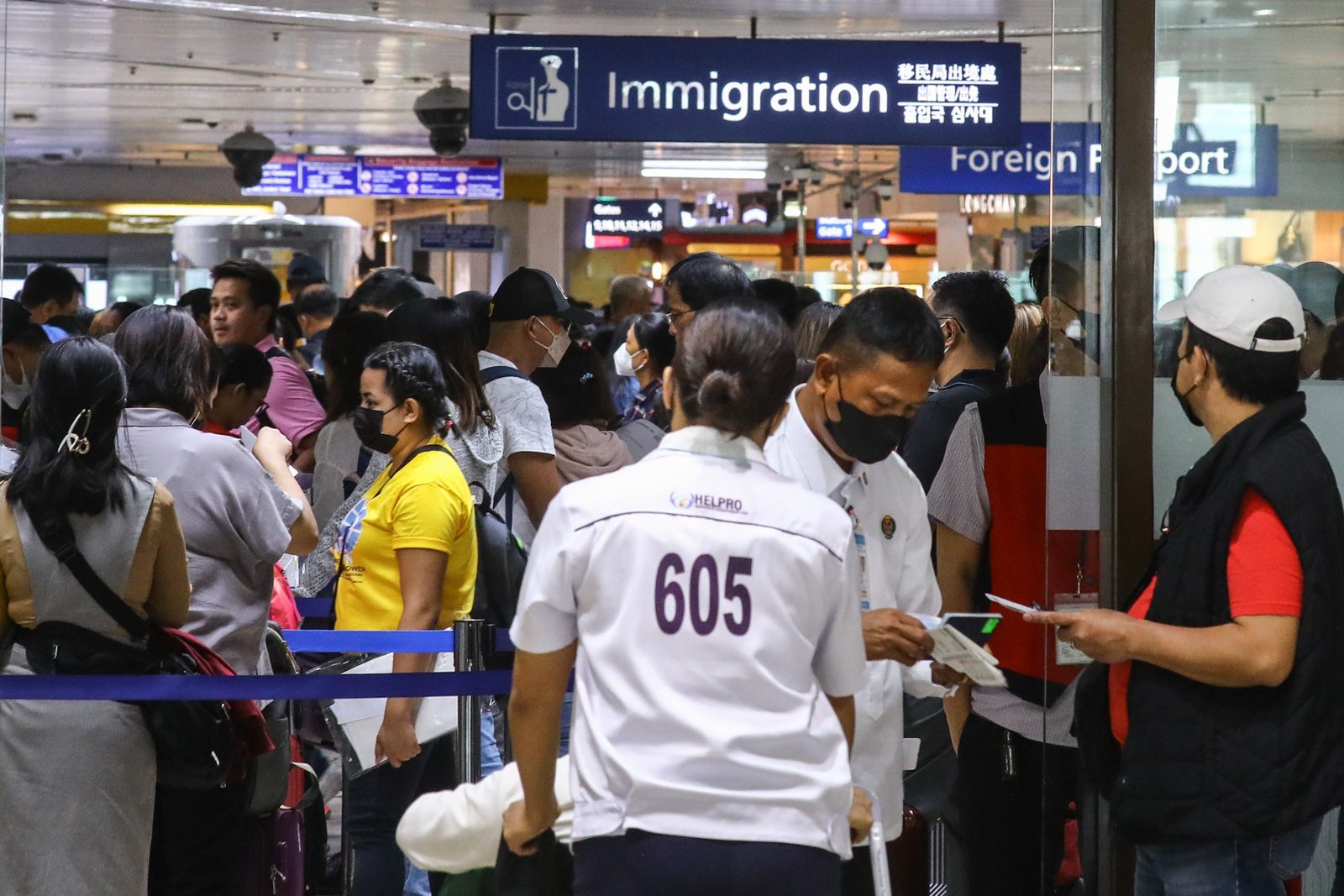
IMMIGRATION. Passengers at the Ninoy Aquino International Airport Terminal 1 queue at the counters and immigration section on Friday, June 16, as the travelers swell at the departure area due to the changes being implemented at the terminals.
Gerard Carreon
MANILA, Philippines – By September 3, Filipinos heading to another country – mostly those traveling for the first time – may need to provide additional documents at immigration counters in line with the government’s revised guidelines for international travelers.
The Inter-Agency Council Against Trafficking (IACAT), which issued the revised departure rules on August 18, said these are necessary to combat the “evolving profile of human trafficking victims.”
The council said that trafficking victims increasingly pose as tourists with sufficient means to travel abroad, but their real intention is to seek overseas employment.
In a press briefing on Thursday, August 24, Department of Justice officials clarified a few things to address apprehensions by the public:
- A large part of the guidelines had always been in place, but they were releasing the details of the revised version “for transparency.”
- The documents specified in the guidelines are not absolute requirements but are a list of supporting papers that may be asked of the travelers.
- The guidelines will mostly apply to first-time travelers, who may be traveling as tourists but are profiled to have intentions to seek work abroad.
- Around 95% of travelers are required to present only these basic documents: valid passport; valid visa, depending on the destination; boarding pass; confirmed return ticket, when necessary.
What may be asked of different types of travelers
Self-funded travelers may now need to provide documents such as proof of accommodation abroad, proof of employment in the Philippines, and proof of their financial capacity or source of income.
Travelers being sponsored by relatives or others abroad may have to show birth or marriage certificates, among other documents, that show their relationship to the sponsors. A notarized affidavit of support and guarantee is among these documents.
Travelers sponsored by a non-relative or a juridical entity, such as a company, may be asked to show a notarized affidavit of support and guarantee, as well as a document showing the relationship between the passenger and sponsor.
Overseas Filipino workers will need to show their OFW clearance from the Department of Migrant Workers – a longstanding requirement usually interchangeable with the Overseas Employment Certificate – along with supporting documents, such as their work permit and employment contract.
Questioning should not take long
As for fears that the additional requirements could extend the already-lengthy immigration process – in some cases, causing Filipino travelers to miss their flights and hampered OFWs from making it in time for the start of their employment – the guidelines say travelers who have to undergo further questioning must not be subject to it for more than 15 minutes . Extensions of this period are only for extraordinary circumstances.
“It is of paramount importance to emphasize that the Revised Guidelines have been formulated not to encroach upon the fundamental right to travel, but to serve as a protective bulwark shielding our fellow citizens from the dire perils of human trafficking,” IACAT said in a press release on Tuesday, August 22.
The guidelines were first published on August 18 and will take effect 15 days from that date, or on September 3. Here is a copy of the full guidelines.
– with a report from Lance Spencer Yu/Rappler.com
Add a comment
Please abide by Rappler's commenting guidelines .
There are no comments yet. Add your comment to start the conversation.
How does this make you feel?
Related Topics
Recommended stories, {{ item.sitename }}, {{ item.title }}, human trafficking, authorities raid pogo compound in tarlac over alleged human trafficking.
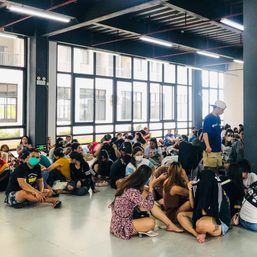
[Free to Disagree] Arrest Quiboloy!
![travel guidelines philippines iacat [Free to Disagree] Arrest Quiboloy!](https://www.rappler.com/tachyon/2024/03/Free-to-disagree-arrest-quiboloy-March-11-2024-1.jpg?resize=257%2C257&crop_strategy=attention)
[EDITORIAL] Kalaban mo ang mga senador na protektor ni Quiboloy
![travel guidelines philippines iacat [EDITORIAL] Kalaban mo ang mga senador na protektor ni Quiboloy](https://www.rappler.com/tachyon/2024/03/animated-quiboloy-kojc-senate-carousel.jpg?resize=257%2C257&crop=365px%2C0px%2C720px%2C720px)
Former Quiboloy foundation director links KOJC to 100 fake marriages in Canada
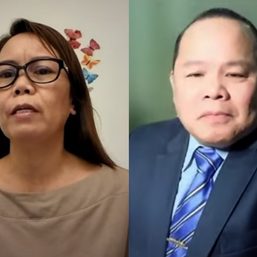
DOJ orders filing of charges vs Quiboloy, 5 others a day before Senate hearing
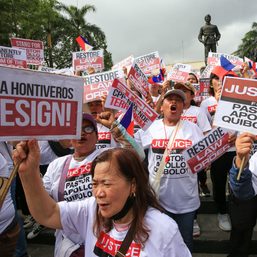
Checking your Rappler+ subscription...
Upgrade to Rappler+ for exclusive content and unlimited access.
Why is it important to subscribe? Learn more
You are subscribed to Rappler+
- Agri-Commodities
- Asean Economic Community
- Banking & Finance
- Entrepreneur
- Executive Views
- Export Unlimited
- Harvard Management Update
- Monday Morning
- Mutual Funds
- Stock Market Outlook
- The Integrity Initiative
- Editorial cartoon
- Design&Space
- Digital Life
- 360° Review
- Biodiversity
- Environment
- Envoys & Expats
- Health & Fitness
- Mission: PHL
- Perspective
- Today in History
- Tony&Nick
- When I Was 25
- Wine & Dine
- Live & In Quarantine
- Bulletin Board
- Public Service
- The Broader Look
Today’s front page, Friday, April 5, 2024

IACAT to implement stricter departure protocols for overseas travelers in September
- Joel R. San Juan
- August 22, 2023
- 3 minute read

THE Inter-Agency Council Against Trafficking (IACAT) announced on Tuesday that it would be implementing stricter departure formalities starting next month in order to stem the rising number of human trafficking victims.
The Department of Justice (DOJ), however, assured that the 2023 Revised IACAT Guidelines on Departure Formalities for International-Bound Filipino Passengers would not curtail the constitutionally guaranteed right of the people to travel “but to serve as a protective bulwark shielding our fellow citizens from the dire perils of human trafficking.”
The revised guidelines will take effect on September 3.
DOJ spokesman Jose Dominic Clavano said the revision was intended to encompass existing policies upheld by member agencies while conscientiously addressing emergent trends in human trafficking.
“The problem has become severe because we have seen a lot of cases wherein Filipinos who are being employed to a regular job abroad are being conned into human trafficking schemes and we’ve seen it too many times that we need to rescue them from abroad,” Clavano explained.
“So, these new guidelines seek to screen them thoroughly before they leave so we don’t have any reasons to initiate rescues,” he added.
Under the revised guidelines, the IACAT said aside from the inspection of basic travel documents, immigration officers may propound relevant clarificatory questions and require outbound passengers to show additional supporting documents.
The IACAT also said secondary inspection should not exceed 15 minutes unless extraordinary circumstances require a longer period of inspections.
The 15-minute period will commence at the start of the interview by the secondary inspection officer.
Bureau of Immigration (BI) spokesperson Dana Sandoval said immigration officers would be looking for documents to prove the relations of a Filipino going overseas with a foreign partner, including photos and other relative documents.
Immigration personnel would also scrutinize the financial capacity of the foreigner to fund the travel and whether the foreigner has already sponsored a trip before.
“Maybe we need to clarify that this is not a means to be strict on our citizens because in fact, based on our data, only 0.6 percent of departing passengers have not been allowed to travel vis-a- vis their actual purpose of travel,” she pointed out.
The IACAT also prescribed new requirements for parents traveling with their children.
Starting next month, passengers traveling with a minor are required to present a certificate of exemption from the Department of Social Welfare and Development if the parents are not married, the traveling companion is a legal guardian, biological father who has sole parental authority or legal custody over the minor orphans traveling with substitute parents.
The guidelines also listed the grounds for immigration officers to defer the departure of a passenger which include: refusal to undergo secondary inspection; doubtful purpose of travel; inconsistent or insufficient travel or supporting documents; misrepresentation or withholding of material information about the travel; presentation of fraudulent, falsified, or tampered travel or supporting documents; non-compliance with previous deferred-departure requirements; or the passenger is a potentially trafficked or illegally recruited person, or a suspected trafficker/illegal recruiter.
IACAT explained that the new guidelines are not stricter compared to before and that they only laid out all of the requirements and documents Filipinos need to secure before traveling.
“IACAT ardently anticipates that the enforcement of these meticulously-refined guidelines, complemented by an enhanced regime of information dissemination, will effectuate a palpable reduction, if not outright elimination, of human trafficking incidents,” it stressed.

Related Topics
- Departure Formalities
- human trafficking
- Immigration
- immigration screening
- Inter-Agency Council Against Trafficking (IACAT)
- passenger requirements
- Passenger Screening Search Keywords: IACAT
- Revised Guidelines
- Travel Regulations

8th Gawad Patnugot Awards: KVNHS emerges as Best Performing Public High School in Calabarzon
- BusinessMirror
DAR training program aims to develop Siquijor farmers’ food livelihood skills
- Jonathan L. Mayuga

Rice prices surging as inflation hits 3.7%
- Cai U. Ordinario
- April 6, 2024

Currency angst going global as strong dollar vexes markets
- Bloomberg News
Recto counsels taxpayers: Heed April 15 deadline to avoid penalty
- Reine Juvierre S. Alberto
‘All about rice’: Inflation busters should focus on rice production
- Jovee Marie N. de la Cruz
DBM releases P49B to DSWD for 4-M indigent seniors’ allowance
- BusinessMirror and Reine Juvierre S. Alberto
Govt tracks El Niño impact on vulnerable sectors as March inflation hits 3.7%
Dmw: 4th pinoy worker injured in taiwan quake, but none yet in japan.
- Samuel P. Medenilla
Trilateral of US-PHL-Japan to focus on economies, but SCS part of agenda

Inflation up 3.7% in March due to high food and transport costs – PSA
- April 5, 2024

DBCC cuts GDP growth target in 2024 to 6.0-7.0%
- Reine Juvierre Alberto
‘Amid lower growth goals, UMIC status still possible’
Vat collection efficiency below global, regional averages in phl, 3 others.
- Andrea E. San Juan

Taiwan quake spells delay for PHL semicon makers
‘bsp to await fed cuts before lowering rates’, climate change disrupts education of 26 million kids.
- Roderick Abad
Lotilla to power players: Help avert summer outages
- Lenie Lectura
Año: PBBM will raise SCS issues with Biden
‘better tax collection offsets impact of lower growth goal’.

Papua New Guinea, PHL eye cooperation on tuna, critical minerals, visa-free entry
- Malou Talosig-Bartolome
- April 4, 2024

DMW: 3 Filipinos hurt in Taiwan earthquake
Input your search keywords and press Enter.
- COVID-19 Full Coverage
- Cover Stories
- Ulat Filipino
- Special Reports
- Personal Finance
- Other sports
- Pinoy Achievers
- Immigration Guide
- Science and Research
- Technology, Gadgets and Gaming
- Chika Minute
- Showbiz Abroad
- Family and Relationships
- Art and Culture
- Health and Wellness
- Shopping and Fashion
- Hobbies and Activities
- News Hardcore
- Walang Pasok
- Transportation
- Missing Persons
- Community Bulletin Board
- GMA Public Affairs
- State of the Nation
- Unang Balita
- Balitanghali
- News TV Live

IACAT to revisit travel guidelines for overseas-bound Filipinos
The Inter-Agency Council Against Trafficking (IACAT) will review the travel guidelines for international-bound Filipinos, whose implementation was temporarily suspended amid concerns from several quarters.
In a statement, the IACAT said it passed a resolution during a special meeting on Saturday formally suspending the implementation of the 2023 Revised Guidelines on Departure Formalities.
''It was further resolved that the IACAT shall revisit the 2023 Guidelines and shall further strengthen its information and education campaign to convey to the public the essential purpose and grave concerns that the 2023 Guidelines seek to address, the IACAT said.
The revised guidelines were supposed to take effect on Sunday, September 3, but lawmakers and some ordinary citizens raised the issue of possible infringement on Filipinos' right to travel.
''The decision to suspend the implementation of the 2023 Revised Guidelines is the Council's response to concerns raised by the public and underscores its dedication not only to protect our citizens against trafficking but to clearly inform them of the protective mechanisms in place and how they work,'' it added.
The IACAT said the guidelines were ''intended to be a tool to enhance screening procedures against untruthful declarations, thus protecting Filipino nationals from becoming victims of this heinous crime.''
''Likewise, they recognized the importance of striking a balance between safeguarding the individual’s right to travel and ensuring national security,'' it said.
The Department of Justice earlier said that the suspension does not affect existing laws and regulations on travel and immigration procedures. — VBL, GMA Integrated News

- Appointment
Philippine Inter-Agency Council Against Trafficking (IACAT) Travel Guidelines

You may like these posts
.png)
Age Limit for Canadian Immigration
Centralized intake office (cio).

38 high demand occupations - Canada
.png)
29 In-Demand Occupations | Canada Immigration New High Demand - Priority List
.png)
Mapquest Canada: Road Maps and Driving Direction
.png)
Hiring Temporary Foreign Workers (Filipino) - Canada

CANADIAN IMMIGRATION CONSULTANCY-SM North EDSA
Address: Unit 301, 3rd Floor, NorthLink Bldg, SMNorth EDSA 1105 Quezon City, Philippines Tel No: 0917 820 2531 Email: [email protected]
Contact form

IMAGES
VIDEO
COMMENTS
Official Gazette of the Republic of the Philippines - The Official Gazette is the official journal of the Republic of the Philippines. ... 2023 REVISED INTER-AGENCY COUNCIL AGAINST TRAFFICKING (IACAT) GUIDELINES ON DEPARTURE FORMALITIES FOR INTERNATIONAL-BOUND FILIPINO PASSENGERS. Uploaded on: August 25, 2023. Resources [PDF] 2023 IACAT Guidelines;
2023 REVISED INTER-AGENCY COUNCIL AGAINST TRAFFICKING (IACAT) GUIDELINES ON DEPARTURE FORMALITIES FOR INTERNATIONAL-BOUND FILIPINO PASSENGERS Pursuant to Republic Act No. 9208 (Anti-Trafficking in Persons Act of 2003), as amended by Republic Act No. 10364 (Expanded Anti-Trafficking in Persons Act of 2012) and Republic Act
Official Gazette of the Republic of the Philippines
Before you leave, know that the Inter-Agency Council Against Trafficking has just released its revised guidelines for Filipinos. Good news: There are no mentions of presenting your high school yearbook or 10 birth certificates of your ancestors. Note that this guideline is a safeguard against potential human trafficking, as government agencies ...
The Inter-Agency Council Against Trafficking (IACAT) is set to implement its revised guidelines for the departure of Filipinos traveling abroad starting September 3. In a recent statement, the ...
(TWG) with the main objective of revising the existing 2015 Guidelines on Departure Formalities for International-Bound Filipino Passengers; WHEREAS, after various meetings and workshops, including public consultations, the TWG developed the "2023 Revised Inter-Agency Council Against Trafficking (IACAT) Guidelines on Departure Formalities for
1. Travelers 15 years and older shall present a remotely supervised/laboratory-based Rapid Antigen Test administered and certified by a healthcare professional in a healthcare facility, laboratory, clinic, or other similar establishment taken 24 hours prior to the date and time of departure from country of origin/first port of embarkation in a ...
Mark Demayo, ABS-CBN News/File. MANILA — The Inter-Agency Council Against Trafficking (IACAT) is set to implement in early September revised departure protocols for Filipinos traveling overseas, in a bid to clarify what documents departing passengers should bring to satisfy Immigration officers on the lookout for potential trafficking victims.
IACAT, which is composed of various government agencies and non-government sectoral representatives, approved the revised guidelines on departure formalities for Filipinos traveling overseas and ...
MANILA, Philippines - In a bid to better protect Filipinos from becoming victims of human trafficking, the Inter-Agency Council Against Trafficking (IACAT) on Tuesday, August 22, released ...
The revised guidelines will take effect on September 3, 2023. Under the 2023 IACAT Guidelines on Departure Formalities for International-Bound Filipino Passengers, here are the documents needed depending on the type of traveler. What are the basic travel documents?
Also read: What It's Like to Travel Internationally for the First Time — We Asked Filipino Travellers A checklist of international travel requirements Image credit: Tony Studio via Canva Pro. The newly revised IACAT guidelines include your basic travel requirements: passport valid for at least six months from the date of departure; boarding pass; visa, if required; and a confirmed return ...
The STAR / Rudy Santos. MANILA, Philippines — After receiving pushback from elected officials and the public, the Inter-Agency Council Against Trafficking has temporarily suspended the ...
The Inter-Agency Council Against Trafficking (IACAT), which issued the revised departure rules on August 18, said these are necessary to combat the "evolving profile of human trafficking victims."
The Inter-Agency Council Against Trafficking (IACAT) signed the Implementing Rules and Regulations (IRR) of Republic Act No. 11930 or the "Anti-Online Sexual Abuse or Exploitation of Children (OSAEC) and Anti-Child Sexual Abuse or Exploitation Materials (CSAEM) Act" on May 18, 2023 at the Justice Hall of the Department of Justice in Padre Faura, Manila.
September 04, 2023. Terminal 3 of Ninoy Aquino International Airport in Manila, Philippines. Credit: Depositphotos. The Philippine government suspended its revised travel guidelines for Filipinos ...
The 2023 Revised IACAT Guidelines on Departure Formalities for Internationally-Bound Filipino Passengers was passed to address the "emergent trends in human trafficking" and not to hamper Filipinos' right to travel, the Department of Justice (DOJ) said. Under the revised guidelines, all Filipino outbound travelers will undergo immigration ...
the "Expanded Act") and its Revised Implementing Rules and Regulations and other related laws; and in furtherance of the mandate of the Inter-Agency Council Against Trafficking (IACAT), as well as the National Strategic Plan 2017-2021 for the effective implementation of the Expanded Act, with a view of having an effective and efficient
Under the revised guidelines, the IACAT said aside from the inspection of basic travel documents, immigration officers may propound relevant clarificatory questions and require outbound passengers ...
MANILA, Philippines — The Senate adopted separate resolutions effectively blocking the Inter-Agency Council Against Trafficking (IACAT)'s new travel guidelines on departure formalities for ...
The Inter-Agency Council Against Trafficking (IACAT) will review the travel guidelines for international-bound Filipinos, whose implementation was temporarily suspended amid concerns from several quarters.. In a statement, the IACAT said it passed a resolution during a special meeting on Saturday formally suspending the implementation of the 2023 Revised Guidelines on Departure Formalities.
The Inter-Agency Council Against Trafficking (IACAT) published the 2023 Revised Inter-Agency Council Against Trafficking Guidelines on Departure Formalities for International-Bound Filipino Passengers on August 18, 2023 in a newspaper of general circulation.This provide for the list of supporting documents that may be asked by an Immigration Officer from an international-bound Filipino ...